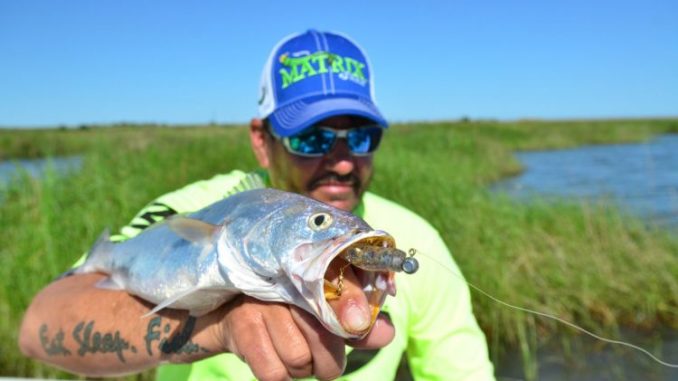
Guest column by the Louisiana Sportsmen’s Coalition
Editor’s Note: This month’s column was written by a representative of Louisiana Sportsmen’s Coalition, a a non-profit group formed with the sole mission of ensuring public access to tidally-influenced water. Visit its website here.
Louisiana’s beloved fishing areas are known worldwide as the Sportsman’s Paradise.
More and more, however, this paradise is becoming accessible to only a select few sportsmen. This is because Louisiana is the only state in America that allows property owners to claim ownership of waters that ebb and flow with the tide. You may be in awe at the absurdity of the notion of owning tidally-influenced water. Or you may be nodding your head, having been told you were trespassing while fishing somewhere yourself.
For a crash course on how we got here, in 1988 the U.S. Supreme Court ruled in Phillips Petroleum v. Mississippi that all navigable waters affected by the ebb and flow of the tide are public and cannot be owned. With coastal erosion turning more land into water every day and with valuable mineral rights sitting below Louisiana’s constantly-increasing waterbodies, this ruling created a problem for those that owned property and mineral rights where land used to be and continues to vanish.
In its ruling, America’s top court left wiggle room for states to define “navigable waterways,” and four years later in Act 998, the Louisiana Legislature dictated that “navigable waterways” shall be defined as waterways which were used for commerce in 1812, allowing other water bottoms and the water that sits above them to be owned.
This meant that all canals dug through Louisiana’s coastal marshes were not defined as navigable, and therefore are not public. It also meant that the waters that exist where land did in 1812 are not deemed navigable and public. Worse, many of Louisiana’s natural coastal waterways that were used for commerce 200 years ago have since silted up due to the canals changing water flow.
As you can imagine, the ratio of private water to public water has skewed strongly in favor of these private property owners in the past 25 years.
For many years, most property owners chose not to restrict access. This has DRASTICALLY changed in recent years. At alarming rates, property owners have enforced their Act 998-granted ability to restrict access to areas in which recreational anglers have fished and traversed for generations. There are areas in coastal Louisiana where as soon as you launch your boat, you’ve entered private property. More and more recreational fishermen are being issued trespassing tickets by local law enforcement. No recreational angler wants a criminal record because he or she tried to go fishing, and charter guides certainly don’t want a ticket that could affect their ability to renew their captain’s license.
Some areas deemed private are blocked by makeshift gates. These present navigation hazards and entrap fish, shrimp, crabs and other wildlife – all a public resource – for the private use of the property owner.
Other areas are patrolled by armed civilians operating unmarked vessels. In many cases, recreational fishermen and charter guides – even with customers aboard – are threatened with physical violence and told to leave by these armed civilians.
If you’re not frustrated by the thought of getting arrested, ticketed, harassed or threatened just for fishing and utilizing what 49 other states consider a public resource, then look at the financial ramifications this may have on your business, your community or your personal investments.
According to the American Sportfishing Association, Louisiana recreational fishing creates an economic output of $1.5 billion annually. The National Oceanic and Atmospheric Administration estimates that Louisiana recreational fishing accounts for 15,000 jobs.
If public access to our fishery continues to be attacked, it won’t just be anglers who are losing. It’ll be the hotels, the restaurants, the gas stations, the tackle shops, the boat dealerships and all the other supporting businesses that rely on recreational fishing effort. If people stand to be threatened, harassed or even worse just for fishing, then why would they ever come back to spend their money fishing in your area, purchasing goods in your community or frequenting your business?
If you’re interested in learning more about how to solve this problem, visit the Louisiana Sportsmen’s Coalition (LaSC) at louisianasportsmenscoalition.com or on Facebook. A non-profit organization started by sportsmen, for sportsmen, the LaSC exists solely to ensure public access to tidally-influenced water. If you’ve gone inshore fishing in Louisiana since 1992, you were almost assuredly trespassing at some point while reeling in that redfish or trout. This must change. The only way to fix this is by changing the law, and that must be done by the Louisiana legislature. If we want to make sure that Louisiana remains the Sportsmen’s Paradise, we must remind our state Representatives and Senators regularly that sportsmen spend a lot of money in Louisiana, that sportsmen vote and that sportsmen are willing and able to stand up for what’s right.
The overwhelming consensus among those people working to gain public access to tidally-influenced water is that in no way should a property owner’s entitlement to mineral rights or land rights be challenged. We’re merely looking for access to what should be public water but that Louisiana law currently considerers private. Supporters of public water access are willing to work with property owners to address issues and concerns they may have such as adverse ownership claims and legal liability. For this effort to be successful, property owners must be protected from liability.
Please consider getting involved so that you and your children can fish freely in a Sportsman’s Paradise instead of being locked out of a playground for the wealthy few.


